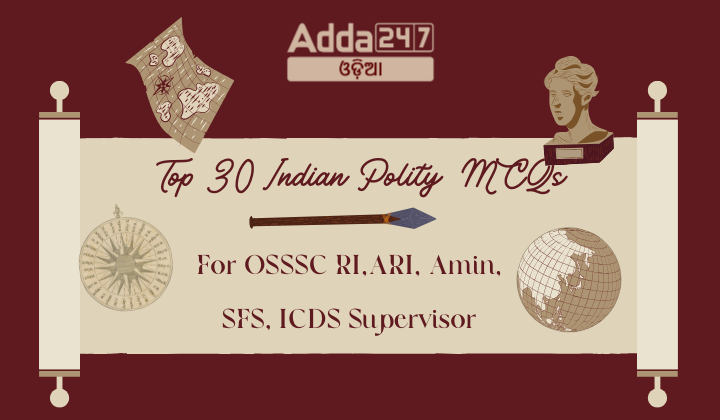Indian Polity is a crucial section for competitive exams like OSSSC RI, ARI, Amin, SFS, and ICDS, where a solid understanding of the Indian Constitution, political institutions, and fundamental principles of governance is tested. Top MCQs often cover essential topics such as the features and significance of the Preamble, the fundamental rights and duties of citizens, and the Directive Principles of State Policy. Questions might delve into the structure and functioning of the Parliament, including the roles of the Lok Sabha and Rajya Sabha, the process of law-making, and the nuances of parliamentary procedures.
Top 30 Indian Polity MCQs for OSSSC RI,ARI, Amin, SFS, ICDS Supervisor
- What is the primary objective of the 16th Finance Commission of India?
(a) To recommend measures for tax reforms
(b) To distribute tax revenues between the central government and the states
(c) To audit state finances
(d) To oversee state election processes
Answer: (b) - Under which Article of the Indian Constitution is the Finance Commission established?
(a) Article 280
(b) Article 290
(c) Article 270
(d) Article 300
Answer: (a) - Who is the current chairperson of the 16th Finance Commission?
(a) Dr. Manohar B. Bairagi
(b) Shri Arvind Panagariya
(c) Dr. Rajiv Kumar
(d) Mr. Ramesh Chand
Answer: (b) - What year is the 16th Finance Commission expected to be constituted?
(a) 2023
(b) 2025
(c) 2024
(d) 2026
Answer: (c) - What does ‘enemy property’ refer to in India?
(a) Property owned by foreign nationals
(b) Properties left by people who migrated to Pakistan or China
(c) Properties owned by criminals
(d) Properties seized during national emergencies
Answer: (b) - Which act established the framework for managing enemy properties in India?
(a) Enemy Property Act, 1968
(b) Enemy Property (Amendment and Validation) Act, 2017
(c) National Property Act, 1984
(d) Alien Property Act, 1952
Answer: (a) - How many enemy properties are estimated to exist in India?
(a) 5,000
(b) 10,000
(c) 13,252
(d) 20,000
Answer: (c) - When was the International Covenant on Civil and Political Rights adopted by the UN General Assembly?
(a) 1948
(b) 1966
(c) 1976
(d) 1984
Answer: (b) - What is the significance of the International Covenant on Civil and Political Rights?
(a) It is part of the International Bill of Human Rights
(b) It provides guidelines for economic sanctions
(c) It regulates international trade
(d) It focuses on military cooperation
Answer: (a) - How many countries are parties to the International Covenant on Civil and Political Rights as of 2024?
(a) 150
(b) 160
(c) 174
(d) 180
Answer: (c) - What is the new name of the Durbar Hall in Rashtrapati Bhavan?
a) Ashok Mandap
b) Ganatantra Mandap
c) Durbar Mandap
d) Rashtrapati Mandap
Answer: b) Ganatantra Mandap - What historical figure is associated with the new name ‘Ashok Mandap’?
a) Emperor Akbar
b) Emperor Ashok
c) Emperor Chandragupta
d) Emperor Harsha
Answer: b) Emperor Ashok - Why was the term ‘Durbar’ replaced with ‘Ganatantra Mandap’?
a) To honor British colonial history
b) To emphasize the concept of a republic
c) To align with Islamic history
d) To preserve colonial influence
Answer: b) To emphasize the concept of a republic - What does the term ‘Ashok’ in ‘Ashok Mandap’ symbolize?
a) Conflict and warfare
b) Peace and unity
c) Colonial rule
d) Economic development
Answer: b) Peace and unity - What is the total financial outlay of the Prime Minister’s package to boost employment and skilling in the Union Budget 2024-25?
a) Rs. 1 lakh crore
b) Rs. 2 lakh crore
c) Rs. 3 lakh crore
d) Rs. 4 lakh crore
Answer: b) Rs. 2 lakh crore - Which organization will execute three of the five employment-linked schemes in the budget?
a) Reserve Bank of India (RBI)
b) Employee Provident Fund Organisation (EPFO)
c) National Skill Development Corporation (NSDC)
d) Small Industries Development Bank of India (SIDBI)
Answer: b) Employee Provident Fund Organisation (EPFO) - What does Scheme A in the employment-linked incentive schemes provide for first-time employees?
a) One-time wage support
b) Training vouchers
c) A one-month wage (up to Rs. 15,000) in three installments
d) A scholarship for further education
Answer: c) A one-month wage (up to Rs. 15,000) in three installments - What is the objective of Scheme D: Centrally Sponsored Skilling Scheme?
a) To create jobs in urban areas
b) To skill 20 lakh youth over five years
c) To provide loans to small businesses
d) To build infrastructure projects
Answer: b) To skill 20 lakh youth over five years - How many youth will benefit from the internship opportunities under Scheme E?
a) 50 lakh
b) 75 lakh
c) 1 crore
d) 1.5 crore
Answer: c) 1 crore - What infrastructure development is proposed to support women’s workforce participation?
a) New public transportation systems
b) Establishment of working women hostels and crèches
c) Expansion of higher education institutions
d) Increase in healthcare facilities
Answer: b) Establishment of working women hostels and crèches - By what percentage has the capital expenditure increased in the Union Budget 2024-25?
a) 5%
b) 7%
c) 9%
d) 11%
Answer: d) 11% - Which two countries signed the first-ever ‘Cultural Property Agreement’?
a) India and China
b) India and Japan
c) India and the USA
d) India and the UK
Answer: c) India and the USA - What does the Cultural Property Agreement aim to prevent?
a) Cultural exchange programs
b) Illegal trafficking of antiquities
c) Exchange of artworks
d) Travel restrictions for cultural workers
Answer: b) Illegal trafficking of antiquities - What type of materials does the import restriction under the agreement cover?
a) Only modern artworks
b) Archaeological and ethnological materials
c) Books and manuscripts only
d) Audio-visual materials
Answer: b) Archaeological and ethnological materials - What is the significance of the Designate List in the Cultural Property Agreement?
a) It lists materials eligible for export from the USA
b) It outlines materials eligible for cultural exchange
c) It includes objects to be returned to India if seized
d) It defines new import regulations for the USA
Answer: c) It includes objects to be returned to India if seized - What historical time frame does the import restriction cover for archaeological material?
a) 1000 BCE to 1500 CE
b) 500 CE to 1900 CE
c) 1.7 million years ago to 1770 CE
d) 1200 BCE to 1600 CE
Answer: c) 1.7 million years ago to 1770 CE - What is the role of US Customs in relation to the Cultural Property Agreement?
a) To facilitate cultural exchanges
b) To conduct archaeological excavations
c) To aid in the quick seizure of Indian antiquities and their repatriation
d) To promote tourism for cultural sites
Answer: c) To aid in the quick seizure of Indian antiquities and their repatriation - Which sector is specifically targeted by Scheme B in the employment-linked incentives?
a) Technology
b) Healthcare
c) Manufacturing
d) Agriculture
Answer: c) Manufacturing - What type of support is provided to employers under Scheme C?
a) Tax rebates
b) Reimbursement of Rs. 3,000 per month for EPFO contributions
c) Training programs for employees
d) Equipment subsidies
Answer: b) Reimbursement of Rs. 3,000 per month for EPFO contributions - How many Industrial Training Institutes (ITIs) are planned to be upgraded under Scheme D?
a) 500
b) 800
c) 1,000
d) 1,200
Answer: c) 1,000










